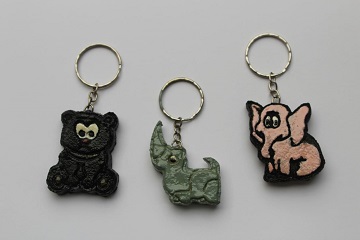IPB Students Invent Bogor Specialty Souvenirs from Tapioca Starch Waste

The level of creativity of students to make use of waste is increasingly needed, especially in processing solid waste from used tapioca flour. One of the creative solutions that came from Bogor Agricultural University (IPB) students is changing the leftover starch into a souvenir from Bogor. It is called Pokopang which stands for a creative and educative ornament made from lefotver tapioca starch waste.
The five students who took part in this project came from the Biology Department of IPB which were Muhammad Ranggag Habibie M, Dian Tri Wahyudi, Asrie Suharti, Anisa Fadila, and Regita Sari. The result of their invention was to become one of the finalists in the Student Creativity Program (PKM) 2018 which was under the supervision of Mafrikhul Muttaqin, M.Si.
Rangga explained that Pokopang could become a media for education towards the community on the topic of biodiversity of animals and plants in Indonesia. It can also add a new variation for souvenirs from Bogor.
“Bogor still lacks variation in their line of souvenirs, our lecturer suggested that we made a certain kind of arts and crafts from the lefotver tapioca starch with a theme that could educate the people, such as keychains which show biodiversity of animals (such as the honey bear, sumatera elephant, and javanese rhino) and also plants, wall decorations/paintings with 3D (three dimentional) textures, and we also plan on creating puppets for students at school,” Rangga explains.
The process of making Pokopang is quite simple, affordable, and does not need too much time. From tapioca producers, they have already aquired lefotver tapioca starch waste which can then be turned into flour. The flour is then mixed with a few other ingreidients (sagoo flour, natrium benzoat, cooking oil, and water). Then, it is printed and dryed out for at least one day, after that it is ready to be put in the oven and painted on.
“So far we have been working on this project by ourselves and the ordering system can be done by pre order and the price is around 5 thousand to 90 thousand rupiah,” explains Anisa Fadila.
The Pokopang team hopes to become the pioneers in youth creativity and give a positive impact towards the environment and community.
“We hope that we can work together with large stakeholders through partnerships so that it is possible to produce in large amounts and can empower the surrounding communities in the village. So arts and crafts such as these can be adapted with the local souvenirs and also add to the regional income. Besides that we hope that we can motivate the youth today to become more creative in processing waste,” says Rangga. (AVR)



